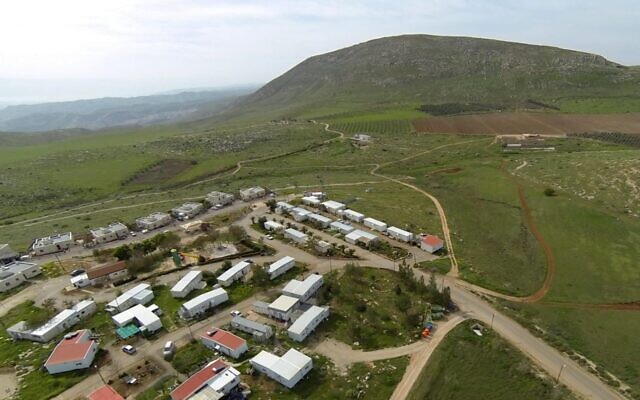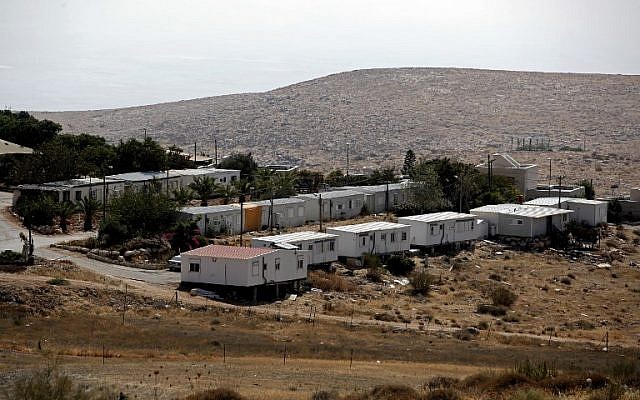Justices approve legal tactic used by AG to legitimize homes built on Palestinian land, but says it can’t apply to Mitzpeh Kramim, because it wasn’t built in good faith

The High Court of Justice in a Thursday ruling ordered the demolition of roughly three dozen buildings in a central West Bank outpost that were built on private Palestinian land. Prime Minister Benjamin Netanyahu said he was “saddened” by the decision.
In a two-one decision, the panel of judges greenlit the use of a legal tactic endorsed by Attorney General Avichai Mandelblit known as “market regulation,” which grants retroactive legalization to outpost homes built on Palestinian land so long as they were constructed in “good faith.” Legal experts say the judges’ authorization could lead to the legalization of nearly 2,000 wildcat homes throughout the West Bank.
However, Justices Esther Hayut and Hanan Melcer, in the majority opinion, ruled that the tactic could not be used to legalize much of Mitzpeh Kramim, as the state and private bodies involved in establishing it should have been aware of its problematic location.

The judges wrote that the Defense Ministry official responsible for earmarking the land on which the outpost was built “closed his eyes to avoid seeing the many warning signs brought to his attention over the years, including the fact that the outpost was established on private Palestinian land.”
The court issued a stop-work order on the several acres of land registered to Palestinians from nearby Deir Jarir, and gave the state 36 months to demolish what Binyamin Regional Council chairman Yisrael Gantz said were four permanent homes, 30 mobile homes and several other community buildings. The judges also ordered the state to provide an alternative housing solution for the residents before their homes are demolished.
Mitzpe Kramim was established in 1999 adjacent to the Kochav Hashachar settlement, on land granted to the settlers by the semi-state-controlled Settlement Division of the World Zionist organization. Shortly after, the Civil Administration — the Defense Ministry body that authorizes West Bank construction — determined that the state did not have rights to the land that the Settlement Division provided.
In 2011, a group of Palestinians from the village of Deir Jarir, claiming ownership over the land on which the outpost sits, submitted a petition to the High Court of Justice to have the community of some 40 families removed.
In order to delay the process, the residents issued their own petition to the Jerusalem District Court, claiming the Defense Ministry had been responsible for settling them on that particular central West Bank hilltop after their original site had been deemed similarly illegal.
In August 2018, the district court accepted the petition in a ruling celebrated by settler leaders, who were hoping it would lead to similar decisions regarding the legalization of other outpost homes throughout the West Bank.
But the district court ruling did not relate to issues of property ownership. With that decision handed down, the High Court was able to move forward with its ruling on the Deir Jarir residents’ claims to the land. If their petition had been rejected Thursday, the state would have been able to move forward with legalizing Mitzpe Kramim.

While the settlers waited for the High Court ruling, they were further emboldened in December 2018 when Mandelblit issued a legal opinion endorsing the use of “market regulation” to potentially legalize thousands of settler homes built on private Palestinian land.
Thursday’s ruling was another in a string of blows to the settler movement, which in recent months has seen its prime goal of West Bank annexation tabled for the foreseeable future in exchange for a normalization agreement with the United Arab Emirates and the so-called Regulation Law struck down by the High Court.
The High Court in June ruled that the aforementioned legislation “violates the property rights and equality of Palestinians, and gives clear priority to the interests of Israeli settlers over Palestinian residents [of the West Bank].”

While similar to market regulation, the implications of the Regulation Law would have been far more sweeping and would have allowed for the legalization of what some experts predicted would be 4,000 homes. The legislation also detailed that any state support creates “good faith.” With market regulation, good faith can only be established in the the real estate transaction itself. In the Jerusalem District Court ruling on Mitzpe Kramim, the judge deemed the Settlement Division’s granting of the land to the residents as an equivalent of a real estate transaction. The High Court on Thursday rejected that argument.
Despite its green-lighting of market regulation, the High Court ruling incensed right-wing lawmakers and settler leaders, who accused the top legal body of gross “far-left bias.”
“I’m saddened by the High Court wrong decision ordering the evacuation of Mitzpe Karmim,” said Netanyahu in a statement. “I instructed the director general of my office Ronen Peretz to meet with the community’s representatives. We will do everything possible to keep the residents where they are and are convinced that we will succeed in this.”
Yamina chairman Naftali Bennett called it “an outrageous ruling that has neither logic nor justice.”
“After the High Court justices ruled not to demolish the house of a murderous terrorist, they have ruled in favor of razing a thriving settlement of our best sons,” he said, referring to a recent decision by the court to order the sealing of the room belonging to Nazmi Abu Bakr, who is accused of killing 21-year-old Sgt. First Class Amit Ben-Ygal by throwing a brick at him from a rooftop. The panel of judges ruled to cancel the demolition of the remainder of the home, reasoning that Abu Bakr’s wife and eight children, who were not involved in the attack, still live there.
“The High Court has become the defender of terrorists’ homes and destroyer of Jewish homes,” Yamina MK Matan Kahana said in a statement.
“Only a heart of stone and hostility to settlement [of] the land could lead to this ruling. Yamina will lead legislative moves to prevent the destruction of the settlement,” Bennett added in his remarks, hinting at promotion of legislation that would allow the Knesset to override High Court rulings.

Moshe Ya’alon, from the more centrist Yesh Atid-Telem party, said in a statement that he read the ruling “with sadness.” However, he asserted that it “must be respected.”
“The state must examine the possibilities offered by the law to change [this harsh decree],” Ya’alon added.
Even on the left, the court’s ruling sparked ire, with Meretz chairman Nitzan Horowitz lamenting its stamp of approval for the use of market regulation to legalize homes built on private Palestinian land.
“The evacuation of the illegal outpost of Mitzpe Karmim is the realization of the commandment ‘thou shall not steal,’” he said, before arguing that the judge’s ruling regarding market regulation “provided an opening for future land expropriations.”
As reported by The Times of Israel
